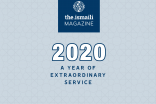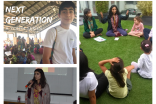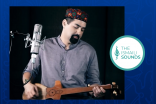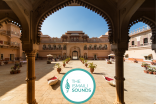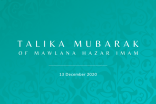Content Tagged with Global
This week, The Ismaili presents an acoustic rendition of Allahuma Salli Aala, performed by Amisha Lakhani in India. Originally written and composed by Khairunissa and Fez Meghani in the United States, the song was first released during the Golden Jubilee, and has remained popular ever since.
The Ismaili is pleased to publish an interview with Shiraz Allibhai, Deputy Director of the Aga Khan Trust for Culture. As part of a series of conversations with key figures, Mr Allibhai discusses the positive impact of culture and its development potential, and humanity’s shared responsibility to preserve heritage.
The phrase, Log kya kahenge meaning ‘what will people say,’ highlights a mindset within South Asian communities about the way people act, hold expectations, or even choose to participate in programs. This mindset has also been a contributing roadblock for many people when talking about and seeking out mental health support.
Since the beginning of time, people have handed down knowledge and lessons from one generation to the next in the form of stories. The novelist Haruki Murakami once said that “Stories lie deep in our souls. Stories lie so deep at the bottom of our hearts that they can bring people together at the deepest level.” For one young member of the Jamat in the Far East, continuing this centuries-old tradition is of crucial importance.
The Ismaili is pleased to present a recent rendition of Ali Antar Ma Mara, a well-loved Gujarati geet, made popular at the time of Mawlana Hazar Imam’s Silver Jubilee.
Sensitive to the needs of our young Jamat in a time of uncertainty, and in the absence of regular in-person camp offerings, the virtual Mosaic camp was an example of innovation and dedication from a small group of volunteers in the UK, looking to inspire and educate leaders of the future.
With optimism and hope for a new beginning, and as we all think about our resolutions for the new year, The Ismaili would like to share with you 21 Goals for 2021!
With a nod to each one of our 21 Ismaili Council jurisdictions across the globe, and inspired by our 20 Goals for 2020, we hope we can resolve to accomplish them all together.
Happy New Year!
Welcome to The Ismaili Magazine 2020: A Year of Extraordinary Service. This digital magazine provides a whistle-stop tour across continents, highlighting the various programmes, initiatives, and events organised by AKDN and Jamati institutions around the world over the past 12 months.
It is tempting to think that we can just leave 2020 behind and look ahead to a fresh new year. However, this might be short-sighted. The bigger picture suggests that collectively, we have never learned so much in such a short space of time — about the world, about each other, and about ourselves. It would be wise to hold on to these lessons, as we may soon need to put them into action...
Since Navroz this year, every special occasion in 2020 has been celebrated quite differently to what we are used to — and this New Year’s Eve will be no different. With many stuck at home and large gatherings prohibited around the world, The Ismaili TV is pleased to provide the opportunity to celebrate the start of 2021 as One Jamat — in your very own home.
The Ismaili is pleased to present Ya Rehman Ya Raheem, performed by Faisal Amlani in Australia. The song’s lyrics reflect back on the tumultuous year we have experienced, calling on the Almighty to resolve our collective difficulties and lead us to calmer times.
Many of us spend our weekends having much needed downtime, catching up with chores or spending time with family. How willing would you be to give that up? Yasmin Heath from Brighton Jamatkhana in the UK did just this when she served on a TKN assignment in Europe. For one weekend every month, for six months, Yasmin travelled to Germany to voluntarily help murids from Afghanistan learn English language skills.
The Ismaili is pleased to present Walk with me, an expressive track calling for hope and kindness as we look towards the new year. Presented by artists from the USA, the song reminds us of our strength when we join hands and work together to positively impact the world around us.
Whether you define it as seva, khidmat, or serviço, the ethic of offering service has been at the foundation of many selfless institutions and individuals around the world. This ethic is seen within our community and beyond, which can help to foster an active and healthy civil society. Youth leaders from around the world have adapted this very mindset: enabling communities through ‘building bridges.’ This phrase of Mawlana Hazar Imam’s is vital to forming a knowledge society, in which best practices — such as the ones used by Shagufta, Aly, and Sara — are shared and implemented worldwide.
This summer, an Aga Khan Education Board collaboration unveiled Bridges, a six-week programme focused on learning and improving communication skills, while connecting students between the ages of 13-17, from across the globe.
Following the recent appointment by Mawlana Hazar Imam of a new Board of Governors of The Institute of Ismaili Studies, Dr Shafik Sachedina reflects back on the history, the ongoing impact, and planned future development of the Institute.
How have arts and cultural organisations handled the events of 2020? Panellists from some of London’s most renowned institutions discussed this question at The Covid Culture Shock, an online event hosted last week by the Ismaili Centre, London.
The Ismaili is pleased to present Zodruz Muborak, the final track in the Salgirah Songs series. The song, which honours the birthday of the Imam, is written in the Pamiri language of Wakhi and is performed by Ismaili music artists in Kazakhstan.
On the occasion of Salgirah, The Ismaili is pleased to present a rendition of Ek Vaar Maare, a popular Gujarati geet dating back to the time of Mawlana Hazar Imam’s Silver Jubilee.
بمناسبة عيد ميلاد سموّه، أرسل مولانا الإمام الحاضر كلمة مباركة إلى الجماعة الإسماعيلية حول العالم، والتي يتم مشاركتها عبر موقع الإسماعيليين.









